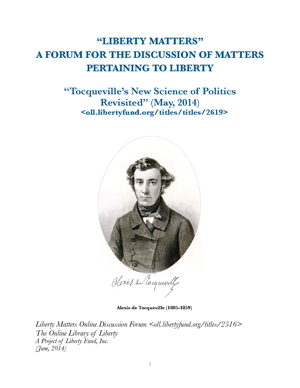
Liberty Matters: Tocqueville’s New Science of Politics Revisited (May 2014)
- Aurelian Craiutu (author)
In this Liberty Matters discussion, Aurelian Craiutu argues that Tocqueville was not just an observer of democracy in America but also a theorist of democracy who wanted to create “a new science of politics” suitable to the new world which was beginning to take shape at that time. This thesis is discussed by Daniel J. Mahoney of Assumption College, Filippo Sabetti of McGill University, and Jeremy R. Jennings of King’s College London.